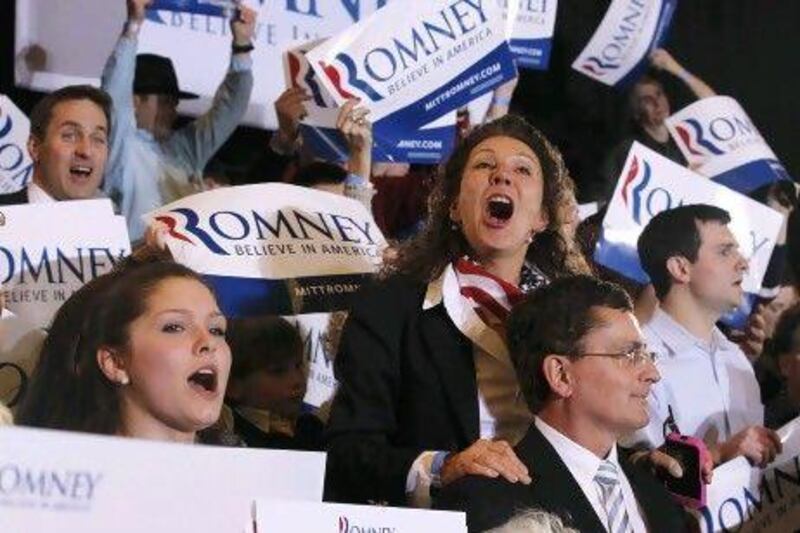WASHINGTON // Although he won six of the 10 states contested on Tuesday, Mitt Romney failed to cement his position as the inevitable Republican presidential nominee.
His narrow victory over Rick Santorum in Ohio leaves open the Republican contest for a challenger to President Barack Obama.
Mr Santorum, a former Pennsylvania senator, carried three states and Newt Gingrich, a former speaker of the House of Representatives, won in Georgia, the state he represented in Congress for almost two decades.
The longer the Republican race drags on, political analysts suggest, the more it benefits Mr Obama.
Mr Romney, a former Massachusetts governor, cannot seem to shake the question marks over his candidacy that every primary race seems to raise.
While he won in Virginia, his first southern victory, he did so only in competition with Ron Paul, the Texas congressman who has failed to win any state. Mr Gingrich and Mr Santorum failed to meet the ballot requirements.
Ohio is a crucial swing state with many lower-income voters, a demographic Mr Romney has struggled with in the past.
The narrow margin of victory there, however, like his victory in Michigan last week, failed to convince those who already view him as a weak candidate.
He should have been the Republican candidate-in-waiting by now, but although he will likely clinch the nomination in the end, he still cannot be said to be sure of it, said Jennifer Lawless, associate professor of government at the American University in Washington.
Winning Virginia and Ohio "didn't hurt him", she said, "but it's still not inevitable".
Much depends on what his rivals decide to do now. Mr Santorum, who has won seven states against Mr Romney's 14, is well ahead of the rest of the field.
Mr Romney has won 415 delegates so far, Mr Santorum 176, and Mr Gingrich 105; 1,144 delegates are needed to secure the nomination by the end of the primary season in June.
Mr Santorum and Mr Gingrich have so far split the conservative vote against Mr Romney, and US media reports suggest Mr Santorum's camp is now trying to persuade Mr Gingrich to drop out.
The problem for Mr Santorum is that Mr Gingrich still considers himself the only viable alternative to Mr Romney.
On Tuesday night, Mr Gingrich invoked the names of the many candidates that at some point during the Republican campaign had held the mantle as Mr Romney's chief rival - from Michelle Bachman, the Minnesota representative, to Donald Trump, the multimillionaire businessman, to Mr Santorum now.
He told a boisterous crowd in Atlanta that, "[t]here are lots of bunny rabbits that run through. I am the tortoise".
Mr Paul, meanwhile, has from the beginning seemed determined to take his candidacy all the way to the Republican convention in August in the hope he might pick up enough delegates to have an influence on the eventual party platform that will be agreed there.
Should none of the candidates drop out, as seems likely, and with a third of the delegates now decided, it is beginning to look increasingly possible that the Republican Party is headed for a brokered convention in late August in Florida.
This would happen if no candidate can secure the necessary 1,144 delegates.
Candidates would then have to bargain at the convention.
It would leave Republicans with two less months to focus their messages for the autumn presidential campaign itself, and thus suit Democrats who already have reason to be cheerful, said Ms Lawless.
Not only is the US economy improving, she said, "[but] with the exception of Romney, none of these guys are top-tier candidates".
Even Mr Romney is a "good candidate for Obama to run against", she said, because he "has often flip-flopped" on important issues and his criticism of Mr Obama's health care reforms ring hollow in view of the similar reforms he introduced in Massachusetts.
It was not accidental that Mr Obama held his first press conference of the year on Super Tuesday- the day of multiple Republican primaries - said Richard Benedetto, a political commentator with Politico. Until then, Mr Obama had contented himself with "dipping his toe" in the campaign water. On Tuesday, he "stuck his foot in", Mr Benedetto said.
"It was a good time for him to get a few messages in, mostly on Iran, where he managed to make the [Republican candidates] look a bit silly."
A dragged-out Republican race, meanwhile, offers Mr Obama more time to make Republicans "look chaotic", said Mr Benedetto, and present himself as "organised and on the job, addressing the big issues".






